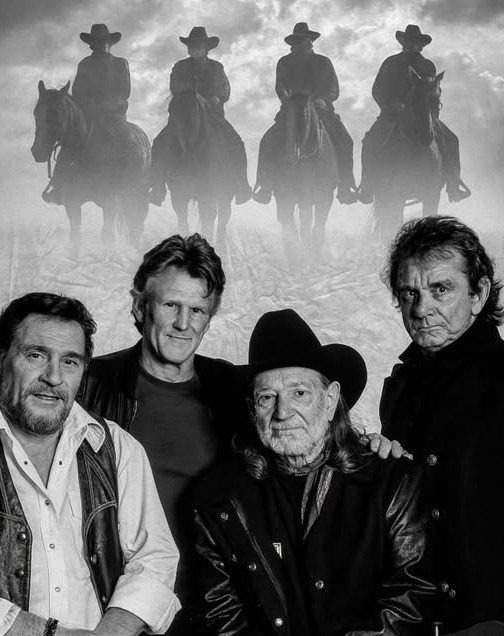
The Birth of Country Music’s Greatest Supergroup
In the early 1980s, when Nashville’s polished sound began to dominate the airwaves, four men stood apart — Johnny Cash, Willie Nelson, Waylon Jennings, and Kris Kristofferson. Together, they formed The Highwaymen, a name that would come to symbolize rebellion, truth, and the untamed heart of country music. They weren’t just musicians; they were storytellers, poets, and truth-tellers with guitars, whose songs spoke for the wanderers, the broken, and the dreamers.
The Highwaymen emerged at a time when country music was losing its edge, drowning in gloss and commercial formulas. Cash’s moral gravity, Nelson’s poetic freedom, Jennings’ rugged defiance, and Kristofferson’s lyrical brilliance united into something extraordinary. Each man brought his legacy — and his scars — to the stage, forming a brotherhood that transcended fame.
Four Legends, One Purpose: To Tell the Truth
The Highwaymen were more than a collaboration — they were a declaration. These were artists who refused to bow to Nashville’s conventions. Johnny Cash, the Man in Black, embodied the conscience of the American soul. Willie Nelson, the red-headed stranger, turned loneliness into melody. Waylon Jennings, the outlaw, demanded authenticity over approval. Kris Kristofferson, the poet-pilot, captured the poetry of pain and redemption in every line he wrote.
When they came together, something electric happened. Each voice — gritty, weathered, and real — carried its own world of stories. But when they sang in harmony, those worlds collided into a single, powerful message: truth matters more than polish.
“Highwayman”: A Song That Defined a Generation
When The Highwaymen released their self-titled debut album in 1985, its lead single, “Highwayman”, became an instant classic. Written by Jimmy Webb, the song told four stories of reincarnation — a bandit, a sailor, a dam builder, and a starship captain — each sung by one of the legends.
It wasn’t just a song; it was a spiritual manifesto. Through it, the men declared that art, like the human spirit, never truly dies. The song climbed to the top of the charts, earning them a No. 1 hit and forever linking their names in music history. When those four voices blended on the chorus — “I’ll fly a starship across the universe divide” — it wasn’t country music anymore; it was mythology set to song.
The Power of Simplicity: No Gimmicks, Just Grit
The Highwaymen didn’t rely on flashy visuals or overproduction. Their power came from honesty. On stage, there were no pyrotechnics, no choreographed routines — just four men, their instruments, and the stories that defined their lives.
When they performed, time stood still. Songs like “Desperados Waiting for a Train,” “Silver Stallion,” and “The Last Cowboy Song” carried the weight of every road traveled, every heartbreak endured. The audience didn’t just listen — they felt.
When Johnny Cash performed “Ragged Old Flag”, his voice cracked with conviction, and the crowd fell silent. It was patriotism stripped of pretense — raw, real, and deeply human. Every performance reminded us that music isn’t about perfection; it’s about connection.
Redefining the Outlaw Movement
Before The Highwaymen, each member had already helped build the Outlaw Country movement — a rebellion against Nashville’s corporate grip. Jennings and Nelson had torn down the walls first, insisting on creative freedom. Cash, always the moral center, gave their cause integrity. Kristofferson gave it poetry.
But together, The Highwaymen turned that rebellion into reverence. They proved that you could challenge the system without losing your soul. They sang about drifters and dreamers, sinners and saints — the people America often forgets.
Their songs became anthems for those who never quite fit in. Theirs was country music with a backbone — fearless, defiant, and timeless.
Brotherhood Beyond the Stage
What made The Highwaymen truly special wasn’t just their music — it was their bond. Behind the scenes, they were friends, brothers, and confidants. They laughed together, argued fiercely, and stood by each other through personal trials.
Willie often said that what united them wasn’t fame or success, but mutual respect. Each man had walked through fire — addiction, loss, and reinvention — and emerged with scars that made them human. When they shared the stage, that brotherhood was visible in every glance, every smile, every harmony.
Even when their tours ended, their connection endured. They recorded three studio albums, and each one carried the spirit of shared truth.
A Legacy Written in Honesty and Dust
The Highwaymen’s influence extends far beyond their era. Their music inspired countless artists — from Chris Stapleton and Sturgill Simpson to contemporary storytellers keeping the outlaw spirit alive. Their songs continue to echo across generations because they spoke to something eternal: the struggle to remain authentic in a world that rewards conformity.
They proved that music doesn’t need to be perfect — it needs to be true. And in that truth, they found immortality.
When we listen to The Highwaymen today, we don’t just hear four country icons. We hear America’s restless soul — its hope, its pain, and its enduring faith in redemption.
The Night That Became History
There are moments in music history when art transcends entertainment — when it becomes testimony. One such night was when The Highwaymen stood together on stage, guitars in hand, and let “Highwayman” ring through the hall. The crowd didn’t cheer at first. They stood in reverent silence, knowing they were witnessing something sacred.
No lights, no filters — just history, heart, and hard-earned truth set to song.
That night wasn’t a performance. It was a reminder of who we are, of what we’ve lost, and of the enduring power of a song sung from the soul.
And that’s why The Highwaymen didn’t just redefine country music — they rebuilt its soul, one note at a time.